It felt pretty surreal to be sitting in a tiny dressing room with Anders Trentemøller, his open suitcase out on one side and his phone on the table. We sat at either end of a really low, small sofa, and it was hard to imagine this man as the creator of music that is the perfect soundtrack to a documentary about a vast, dark alternative dimension – particularly because he was so friendly and somehow endearing in his awkwardness.
Stylistically elusive and technically diverse, Trentemøller seems to revel in keeping critics and listeners guessing from one release to the next. His latest album, Lost, plants one foot in indie rock territory and features an impressive array of guest vocalists. It has been the recipient of mixed, and even blunt criticism – see the Guardian review of his first gig touring the new album, and what appears to be Trentemøller’s personal response in the comments section. Nonetheless, the consensus is clear: as a producer, he’s a super talented kinda guy. I caught up with him to discuss supporting Depeche Mode, the creation of his latest album and the upcoming European tour.
What was it like growing up in Vordingborg?
(Sounds surprised) Vordingborg! Vordingborg is a quite small city, so for me being a little kid it was really great because there was a lot of nature and places to play. But when I got older in my teens it was really boring because nothing really happened, so that also kind of forced me to do something, because it was pretty easy to get bored. You could play football or ride your bike or do music, so I chose music.
So you were interested in music from an early age?
Yeah yeah, definitely yeah.
Was that due to your environment or did you just naturally progress in that direction?
It was something that just came naturally, no one in my family actually plays an instrument. So it was just something that came from listening to the radio. Very often I was playing the piano while the radio was running, so it was quite easy for me to play along and remember the tunes that are played on the radio. I found it quite easy to do that.
What was it like supporting Depeche Mode?
Yeah yeah, that was crazy, they were one of the bands that I was listening to. I listened a lot to The Cure and all those bands, so of course it was crazy suddenly to be playing the same stage as them and hanging out with Martin Gore, having a drink with him and the band. It was really kind of bizarre because he was telling me that he was a big fan of my music and I was like, OK! It’s me that’s a big fan of your music! So that was pretty weird in a way. And really great because also these guys are really down to earth and nice people.
Kind of a perfect experience!
Yeah, my vision of how the band was, it was actually better to me [in reality] because sometimes your idols… You can can put them on such a high pedestal.
How did the Depeche Mode crowd respond to your music?
They were really up for it, and I also think that they asked me because we also, especially when I’m playing live, mix rock elements with electronic elements. So that fitted the Depeche Mode crowd quite well because their fans are actually known for being quite, only into Depeche Mode, you know, and quite dedicated. But yeah, we got such good feedback and it was really great for us.
Lost is an amazing album. ‘The Dream’ with Low’s Mimi Parker and ‘Come Undone’ with Blonde Redhead’s Kazu Makino sound just like missing songs from each band. How did you do that, did it come quite instinctively or did you have to make an effort to match songs with their intended vocalist?
Yeah, actually all the vocal songs are written specifically for that vocalist. The Low song just came one morning when I was playing with my wurlitzer, a kind of old piano that I have in my apartment, and I was just doing these chords that really reminded me of Low and I thought, oh, it could really be cool if somehow Mimi Parker could do the vocals on it. But I kind of forgot about it and also thought, she is so busy doing all this other stuff, so I really didn’t think about it for quite a long time. Then one day I talked to one of my friends and he was saying, like, why don’t you just try to send the track to them? You can only get a no and that’s also fine, so I got in contact with them and she really loved the track and she was up for working with me. So that was really weird to suddenly work with one of your heroes.
Was there anyone you tried to approach to work on the album that you couldn’t get hold of?
No, I was really lucky because my problem would be if, for example, Kazu from Blonde Redhead said no to singing on this track, it would kind of fall apart because that track was written for her voice. Without her knowing, of course! The weird thing is that these tracks were nearly finished but the vocalist didn’t know about it, and many of them didn’t even know about me.
When you approached potential vocalists saying you had written a song specifically for their voice, how did they react to that?
I think they were happy. Of course, they should kind of love the song, that’s the first thing. Then it doesn’t really matter if it’s written for them or for anybody else I think. If the melody is good and strong enough, and if they somehow can see themselves in my music, because that’s also a thing of course. This Low track is quite similar to the Low sound, but then with the track with Jonny Pierce from The Drums, and also Sune [Rose Wagner] from Raveonettes, those tracks are quite different from what they normally do. Sometimes it’s fun for me to take those artists out of their normal sound or normal universe, and try to put them in something that’s a bit different, but maybe has a melacholic and a dark side.
Did you write their lyrics?
No, that is very important for me in every track that I work with a vocalist on, because I really believe that you then get the most honest and purest result. And me personally, I’m really bad at doing good lyrics, my force is making the music and writing the melodies. And also telling Low what to say… That wouldn’t feel right for me.
Did you have to change the album very much for the live tour?
Yes and no, because I really like not to play exactly the same versions as appear on the album. Also because there are a lot of keyboards and maybe, like, seven guitars on top of it all… And you can’t have seven guitars onstage, that would be a little too much. It’s also about rearranging all the music and building it up together with a band. And I also have my background playing in a lot of bands when I was younger, so I’m aware of what each instrument is capable of, and also what the people playing it are capable of. Very often it’s me going to the drums and showing the drummer how I want the beat, but he can play it much better than me. But still being able to grab the guitar or grab the bass and actually play it for them… Because if you just like talk about it, like this bass should be a little bit dark with a melancholic thing, or an evil thing, that is maybe a little bit hard for people to understand (laughs) so then playing it is much easier.

You’ve used a lot of unusual instruments in your music in the past…
Yeah, in this album it is more commonly known instruments like drums, bass, guitars. And of course there’s this instrument called a theremin where you play it without touching it, it’s a really weird old Russian instrument. Then I also used something called a celesta, it’s an older, kind of, not a piano but an old small keyboard thing. Kind of a glockenspiel, it has a bell sound.
How do you come across instruments like the celesta?
That was actually one I bought on eBay, and this is one hundred and thirty years old, so it’s a really old instrument. It was actually shipped from the States because that’s the only place it was. When I saw the photos of it, it seemed like a quite small instrument, but when I got it, it’s like, so heavy. So expensive to send.
It has a beautiful sound.
Yeah it sounds fantastic. It has this magical thing that it’s not possible to do on a computer.
So I hear the visuals for your set on this tour are being done by Henrik Vibskov…
Yeah, and Henrik is actually, it’s crazy because he’s one of our most famous fashion designers in Denmark now, and he really has a big kind of fashion empire. But he’s still really really down to earth, and also a person that is interested in playing with creative things and doing other stuff rather than actually doing fashion, and plays drums also.
Hasn’t he played drums with you on tour before?
Yeah, Henrik played with me for two or three years, but now he’s so busy doing his own stuff, he’s got two children now. So Henrik is not touring with me anymore, but he’s still part of the visual side.
Is that more of a collaborative thing or does he have strong ideas about what he wants to do?
He has quite strong ideas, and I really trust him because I really love his work and I love the way he plays with things. But we also talk about what would fit into my show. Sometimes he comes up with great ideas and he’s maybe drawing this fantastic thing, but we actually need to build it and be able to travel with it, and put it up at festivals or this stage tonight. It also has to be something that’s working after thirty gigs, you know, so there’s a lot of work in there.

What’s in store for the visuals tonight?
It’s really hard to explain… (makes a lot of sweeping hand gestures) it’s kind of big… I don’t know what the English word is (continues to gesticulate)… a lot of fabrics… (laughs). It’s important for me that there’s also space for doing something that we don’t really have planned. There are some tracks we just kind of jam, actually, and see what happens. And it’s very important for me that it doesn’t feel too designed, and it should also be much more, kind of, organic and sometimes a bit… not funny, but like… magical things going on. I’m trying to do both a normal rock concert but then also put other elements into it. And we’re not using any video projections, everything is built onstage… We didn’t want those video projections because sometimes you see that and it’s like watching MTV or something, you know. So of course we really want the visuals to fit into the music, but I don’t want it to be like, I’m doing a chord and then you have a spotlight.
Is there somebody performing the visuals as well as you performing the music?
Yeah, our tour manager is actually our light guy, they work together. He stands on the side with a remote, and of course he knows when to put them up and down because I’ve told him to. We’ve practised that quite a lot, but still it’s possible for us to suddenly change while we’re playing and maybe play a new track in a different order. It’s just about him looking at what we’re doing onstage and then kind of being fast. But our set-up is quite simple so it’s much more about the light.
How naturally does playing with visuals and audio together come, can you see yourself eventually doing more stuff like making the soundtrack for Danish film Det som ingen ved (What no one knows)?
That was fun to do. It was like five years ago now but when I look back there was also a lot of work. I used like, ten or eleven months working on that [at this point, promising bassy soundchecks begin to boom up through the floor]. But it’s maybe the last time I will do a whole soundtrack, because it really takes up so much of your time. And then I would rather go out and play my own music. But it was really great for me, and also a big challenge, because you’re forced to work with a director and a producer, there’s a lot of people having an opinion of your work, and when I’m doing my album I can just follow my heart. There’s no one to say stop, and sometimes that can also be difficult, but I really like that if something doesn’t work on the album it’s only my fault. But if something is very good it’s also me, and I can say kind of, hey that was good.

Words: Amris Kaur
Photos: Rob McDougall
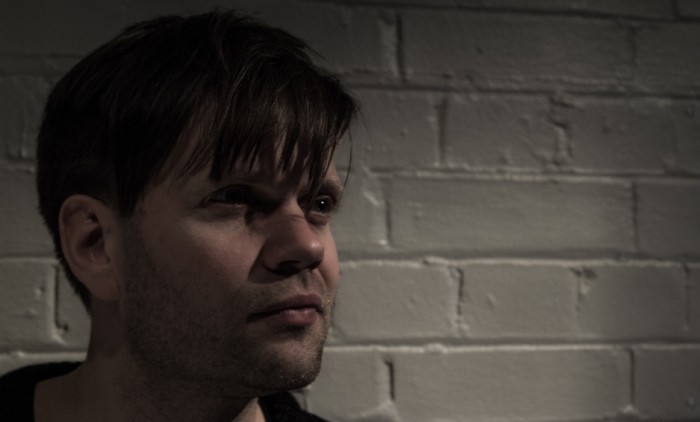
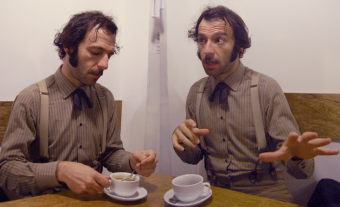

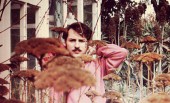
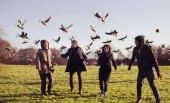
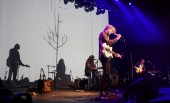
Follow us
Follow us on Facebook Follow us on Twitter Follow us on Google+ Subscribe our newsletter Add us to your feeds